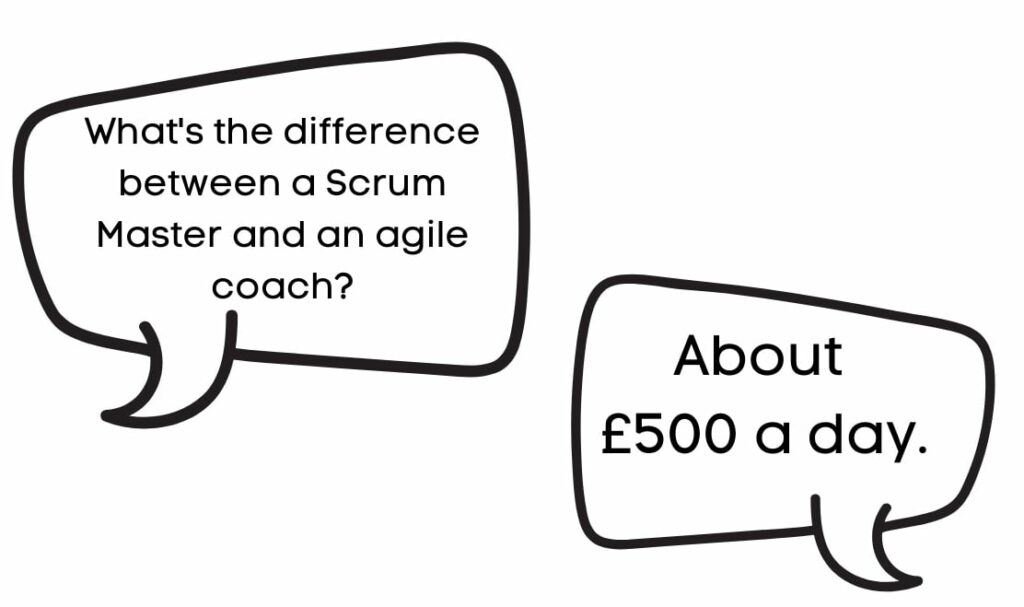Embracing Your Scrum Master Journey: Defying Conventions and Finding Fulfillment
Posted By - Geoff Watts

Once upon a time, there was a Scrum Master named Alex. Alex is a Scrum Master at a thriving software development company and has spent the last five years dedicating their time and energy to supporting and empowering their team. In those five years, Alex has developed their Scrum Mastery, fully embracing the servant-leadership mindset inspired by Robert K. Greenleaf’s writing. The team was well on their way to Team Mastery and the organisation was beginning to change, with policies and procedures slowly shifting to support continuous delivery of value.
One spring afternoon, as Alex sat in their favourite coffee shop sipping on a latte, they began to ponder their future. Their mind wandered through various questions, such as “What’s next for me?”, “How can I grow in my career and make a greater impact” and “How can I pay off my mortgage quicker?”
Alex felt both excited and nervous about the possibilities ahead, wondering if they were alone in their uncertainty so searched some online forums and discovered that they were not alone. Many Scrum Masters shared similar concerns and aspirations, seeking guidance on career growth and fulfilment.
This blog post is for those, like Alex, who are ready to challenge industry assumptions and explore the various career paths available to Scrum Masters while staying true to the servant-leadership principles and pushing the boundaries of what’s possible.
The Peter Principle
In today’s fast-paced world, society and culture often push individuals to seek the “next step” in their career path, encouraging them to strive for something “bigger and better.” However, it’s worth considering the value of defying convention and staying in a role that you truly love and excel in.
While it’s essential to challenge yourself and step outside your comfort zone, there is merit in embracing the fulfilment and expertise that comes from mastering a role you’re passionate about. This notion is supported by “The Peter Principle,” a concept that suggests people are often promoted to a level of incompetence, where their skills may no longer match their new responsibilities. By staying in a role you love and are great at, you can continue to create value, contribute meaningfully to your team and organisation, and enjoy a deep sense of personal and professional satisfaction.
But if you do genuinely find yourself itching to find “the next step” then there are plenty of options. The current default seems to be that the “next step” for Scrum Masters is to become an “agile coach”, hence the joke Nigel Baker, Paul Goddard and I included in our book Pun Mastery:

What is The Role of a Scrum Master?
The Scrum Master role, as initially defined, is deeply rooted in the concept of servant-leadership. Robert K. Greenleaf, the father of servant-leadership, believed that leaders should primarily serve their teams, focusing on their growth and well-being.
It’s likely that you got into the role of Scrum Master because some of the principles of servant-leadership spoke to you. The idea of challenging the toxic culture of striving to climb the traditional hierarchical pyramid, enabling teams to transform from order takers to creative innovators.
Scrum Masters, as servant-leaders, prioritise the needs of the team, enabling them to perform at their best and deliver value so, as you consider your career progression, many will want to remain true to the core principles of servant-leadership. By doing so, you can maintain personal fulfilment and make a positive impact on the world.
Following Personal Fulfilment

If you are passionate about working directly with teams and enabling their success, there are other roles that may offer even more fulfilment. Roles such as:
Senior Scrum Master:
A Senior Scrum Master is similar to a Scrum Master but typically has more experience and may oversee multiple teams or larger, more complex projects. They often mentor and support other Scrum Masters within an organization and contribute to the broader Agile community.
Team Coach or Mentor:
In this role, a Scrum Master can continue to support and guide Agile teams while also providing mentorship and coaching to new Scrum Masters or team members. This role allows for direct involvement in value-creation and team development.
Agile Practice Lead:
This role involves leading the Agile practices within an organisation or business unit, working with multiple teams, and ensuring consistent Agile implementation. While this role may involve some higher-level responsibilities, it still allows for close interaction with teams and direct involvement in their success.
Community of Practice (CoP) Leader:
As a CoP Leader, a Scrum Master can create and maintain a community centered around Agile practices, Scrum Masters, and related roles within the organization. This role allows the individual to share their knowledge, mentor others, and foster a collaborative environment. While they might not work directly with individual teams, they can still have a significant impact on their success and personal growth.
Some of these roles may also offer higher salaries which brings me on to:
Embracing Financial Growth

Despite the joke above, in my research, the salary for experienced and impactful Scrum Masters is very attractive in its own right. Having said that, there is nothing wrong with seeking a higher salary or pursuing financial growth. While some may frown upon this, ambition and the desire for financial stability are natural human instincts.
Some roles that often attract higher salaries include:
Agile Coach:
While it’s still a very ambiguous job role, an Agile Coach is often seen to work at a higher organizational level, guide multiple teams and help tackle organizational impediments to agility. They could mentor Scrum Masters, Product Owners, and other Agile roles, provide expertise and support in Agile practices, organizational change, and continuous improvement.
Agile Consultant:
An Agile Consultant is often an external role who positions themselves as an expert advisor. They typically work with multiple clients, assessing their Agile maturity, recommending improvements, and providing training and coaching to help the organization achieve its Agile transformation goals.
Agile Trainer:
An Agile Trainer specializes in educating and training individuals and teams in Agile methodologies and practices. They design and deliver training programs, workshops, and seminars, helping participants develop the skills and knowledge needed for Agile roles such as Scrum Master or Product Owner.
Product Owner vs Product Manager:
A Product Owner is responsible for defining the product vision, prioritising work, and ensuring successful delivery. They collaborate closely with the Scrum Master and the development team to maximise the value of the product being developed. While the Scrum Master focuses on facilitating the team’s process and practices, the Product Owner is responsible for making decisions about the product itself, representing the interests of the customers and stakeholders.
On the other hand, a Product Manager is responsible for the overall strategy of the product. They work closely with stakeholders to define the product roadmap and ensure that it aligns with the company’s goals. Product managers are responsible for identifying new opportunities and ensuring that the product remains competitive in the market.
While all of those roles often offer higher salaries, I also know of Scrum Masters who earn more than any of those roles (even agile coaches despite the joke!).
As you explore career options, don’t shy away from opportunities that offer increased compensation. Striking a balance between personal values, fulfilment, and financial growth is the key to a successful and satisfying career.
Exploring Creative Career Options

As Scrum Masters, challenging the status quo is inherent in your role. In my book “Scrum Mastery,” I highlight the characteristic of being “disruptive” as an essential quality for Scrum Masters.
This mindset could also be applied to your career journey. Instead of following the default path from Scrum Master to Agile Coach, you could consider alternative opportunities that align with your passions and skills.
As a Scrum Master, your skills are highly transferable, opening up possibilities beyond software or product development. You could consider exploring opportunities in:
- Education and training: Use your Scrum Master expertise to teach Agile practices and mindset to others, helping them develop the skills needed for success in their careers.
- Non-profit and social impact work: Apply your Agile knowledge to non-profit organisations or social impact projects, creating positive change in the world.
- Entrepreneurship: Leverage your Agile skills and servant-leadership mindset to start your own business or join a startup, contributing to innovative solutions and creating value in new ways.
- Public sector: Bring Agile principles and practices to government agencies, helping them become more efficient and responsive to the needs of their constituents.
Scrum Masters have numerous career paths available to them, and it’s important to stay true to your personal values and goals. If you’re not sure of your values you could try running a Core Values exercise and assessing those options against those values. I also coach people on this topic quite often.
In conclusion, our Scrum Master journey is our own to define. Whether we decide to stay in our current role or pursue new opportunities, it’s important to strike a balance between personal and professional fulfilment. By embracing the disruptive mindset that characterises Agile, challenging societal expectations, and continuing to cultivate a servant-leadership mindset, we can successfully navigate our unique path and make a positive impact on the world through our work.





